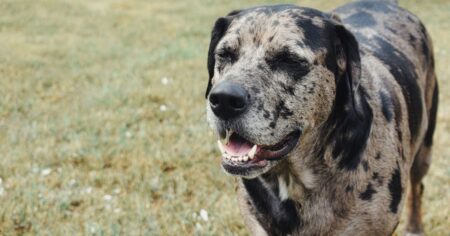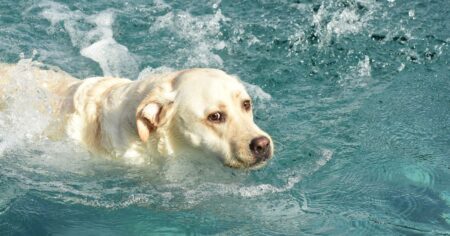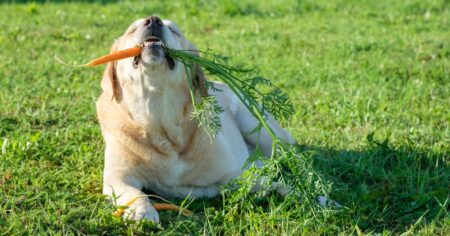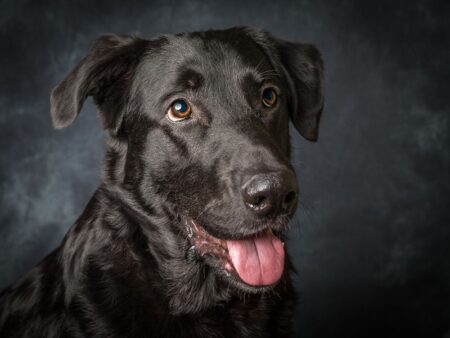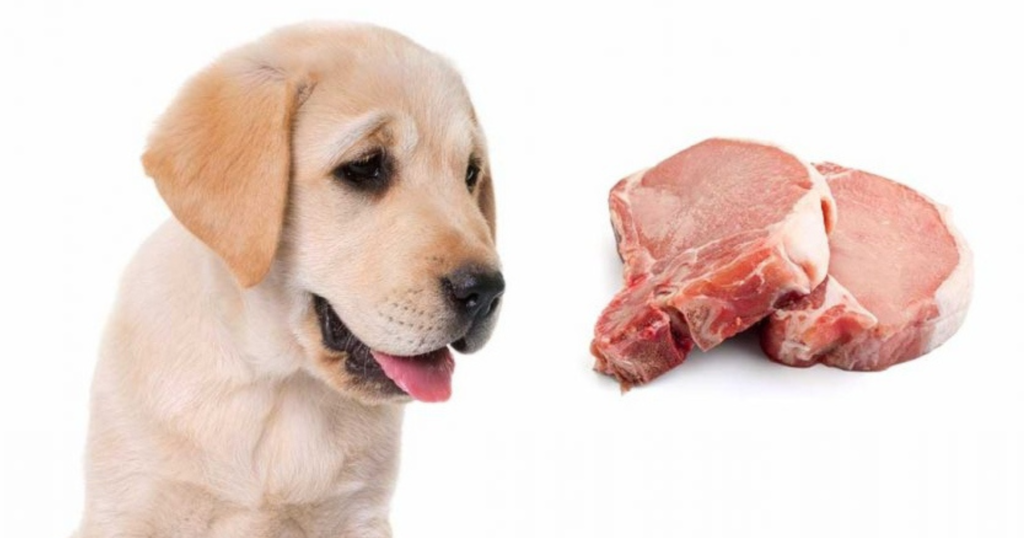
Dogs are known to be man’s best friend, and many pet owners consider their furry companions as part of their family. As such, it’s only natural for dog owners to want to share their food with their pets. However, not all human foods are safe for dogs to consume, and pork is one of the most debated ones. So, can dogs eat pork?
The answer is yes, dogs can eat pork, but with some conditions. According to the American Kennel Club (AKC), plain, cooked pork is safe for dogs to eat, as long as it’s simple and free from the seasonings and spice rubs that people tend to cook with. Pork is a rich source of protein, and it also contains essential amino acids that dogs need to maintain their health. However, pork should not be a staple in a dog’s diet, and it should be served as an occasional treat.
Can Dogs Eat Pork
Pork is a common meat that many people enjoy, but what about dogs? Can they eat it too? The answer is yes, but there are a few things to keep in mind.
Firstly, it’s important to note that dogs should only eat plain cooked pork. The ingredients that we use to make pork flavorful, such as garlic, onion, chili powder, mustard, and lots of salt, all pose dangers to our pups. That means that the cooked pork off of a human’s plate (including that slice of fried bacon) is too decadent for your canine companion. [1]
Secondly, it’s important to ensure that the pork is fully cooked. Eating raw or undercooked pork is not safe for dogs or humans due to the parasite trichinella spiralis larvae, which can cause a parasite infection known as trichinosis. An infection of trichinosis can cause diarrhea, vomiting, and even death. [2]
Thirdly, it’s important to feed pork in moderation. While pork can be an excellent source of nutrition for your dog, it should not make up the majority of their diet. Too much pork can lead to digestive issues, such as diarrhea and vomiting. [3]
In conclusion, dogs can eat pork, but it should be plain cooked pork, fully cooked, and fed in moderation. By following these guidelines, you can safely incorporate pork into your dog’s diet and provide them with a tasty treat.
When Is Pork Bad For Dogs
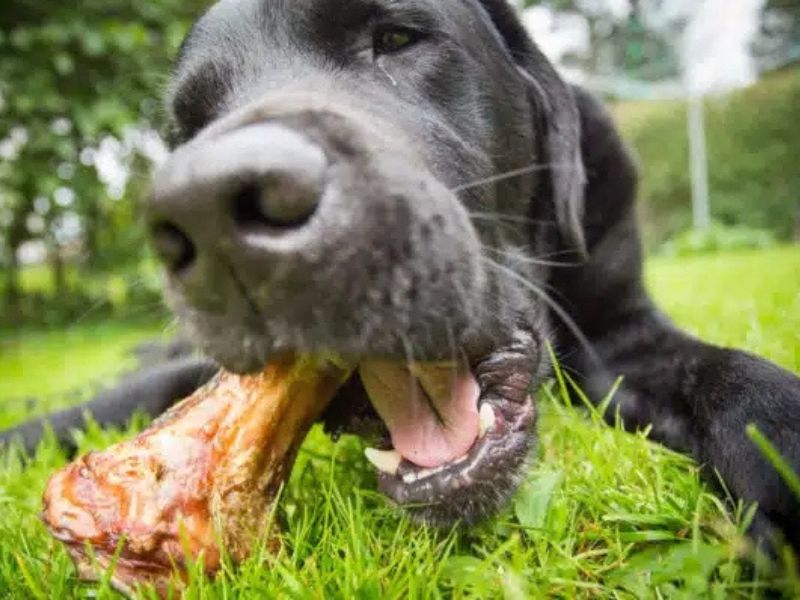
While pork is generally safe for dogs to eat, there are certain situations when it can be harmful to their health. Here are some instances when pork should be avoided:
- Raw or undercooked pork – Raw or undercooked pork can contain harmful bacteria and parasites such as Salmonella and Trichinella that can cause food poisoning and other health problems in dogs. It is important to cook pork thoroughly to an internal temperature of 145°F to eliminate the risk of these harmful pathogens.
- Fatty cuts of pork – Pork is a high-fat meat, and fatty cuts such as bacon, sausage, and pork chops can cause pancreatitis, a painful inflammation of the pancreas, in dogs. Pancreatitis can lead to vomiting, diarrhea, loss of appetite, and other serious health issues.
- Seasoned or processed pork – Processed pork products such as ham, hot dogs, and deli meats are often high in sodium, preservatives, and other additives that can be harmful to dogs. Seasonings such as garlic and onion can also be toxic to dogs and should be avoided.
- Bones – Pork bones can splinter and cause choking, blockages, or perforations of the digestive tract in dogs. It is best to avoid giving your dog any bones, including pork bones.
If you want to feed your dog pork, it is important to choose lean cuts such as pork loin, tenderloin, or boneless pork chops that are cooked thoroughly and served in moderation. Additionally, it’s always a good idea to consult with your veterinarian before introducing any new food to your dog’s diet.
How Can I Feed My Dog Pork
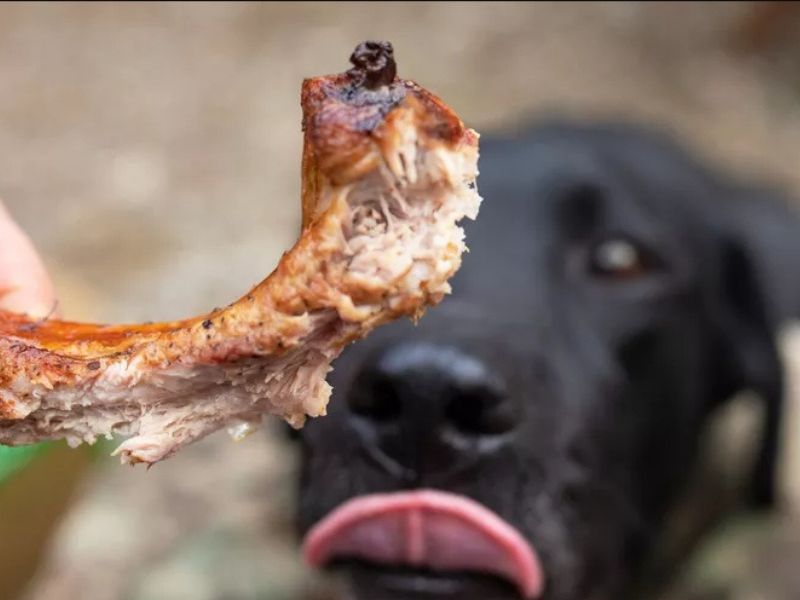
If you decide to feed your dog pork, it’s important to do so in moderation. Pork should not be a regular part of your dog’s diet, but rather an occasional treat. Too much pork can cause digestive issues, including diarrhea and vomiting.
When feeding pork to your dog, make sure it is cooked thoroughly. Raw pork can contain harmful bacteria that can make your dog sick. Avoid giving your dog pork that is seasoned with onions or garlic, as these can be toxic to dogs.
You can also consider incorporating pork into your dog’s homemade meals. However, it’s important to ensure that the meal is well-balanced and meets all of your dog’s nutritional needs. Consult with a veterinarian or canine nutritionist before making any significant changes to your dog’s diet.
Overall, feeding your dog pork can be a safe and enjoyable treat, as long as it is done in moderation and prepared properly.
Get Pippa’s Training Tips
Pippa Mattinson is a renowned dog trainer with over 40 years of experience. She has shared her easy-to-follow dog training instructions and practical tips on her website. Here are some of Pippa’s training tips that can help you train your dog to eat pork safely:
- Introduce pork gradually: If your dog has never eaten pork before, it’s best to introduce it gradually. Start with small amounts and monitor your dog’s reaction. If your dog shows signs of digestive distress, stop feeding pork and consult your vet.
- Avoid fatty pork: Pork is high in fat, which can contribute to weight gain and other health issues. Avoid feeding your dog fatty pork cuts like bacon or pork belly. Instead, opt for leaner cuts like pork loin or tenderloin.
- Cook pork thoroughly: Cook pork thoroughly to kill any harmful bacteria that may be present. Undercooked pork can cause food poisoning in dogs, just like in humans.
- Avoid seasoning pork: Seasonings and spice rubs that contain garlic, onion, or other harmful ingredients should be avoided. Plain, cooked pork is safe for dogs to eat.
- Monitor your dog’s weight: Pork can be a healthy addition to your dog’s diet if fed in moderation. However, it’s important to monitor your dog’s weight and adjust their diet accordingly. If your dog is gaining weight, reduce the amount of pork you’re feeding them.
By following these tips, you can safely incorporate pork into your dog’s diet. However, it’s always best to consult your vet before making any dietary changes for your dog.
Can Dogs Eat Raw Pork Meat
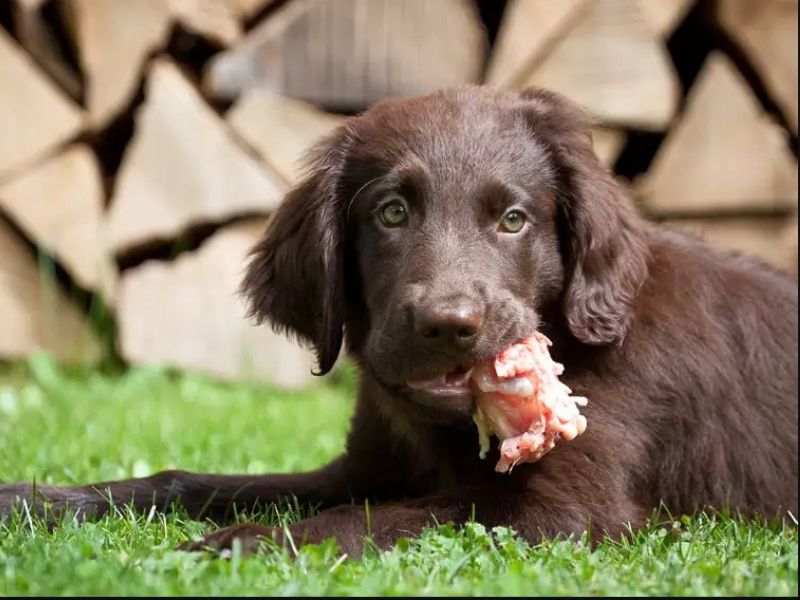
Dogs can eat raw pork meat, but it is not recommended. Raw pork meat can contain harmful bacteria, such as Salmonella and E. coli, that can make dogs sick. Additionally, raw pork meat can contain parasites that cause diseases in both dogs and humans.
If a dog eats raw pork meat, it can experience symptoms such as vomiting, diarrhea, and fever. These symptoms can be severe and require veterinary attention. Therefore, it is best to avoid feeding raw pork meat to dogs.
Can Dogs Eat Raw Pork Bones
Dogs should not eat raw pork bones. Raw pork bones can splinter and cause blockages in a dog’s digestive system. This can lead to serious health problems, such as intestinal obstructions and perforations.
Cooked pork bones are also not recommended for dogs, as they can still splinter and cause harm. Instead, it is best to give dogs chew toys that are specifically designed for their chewing needs. These toys can help keep a dog’s teeth clean and provide them with a safe outlet for their chewing behavior.
In summary, it is not recommended to feed dogs raw pork meat or bones due to the potential health risks. It is important to provide dogs with a balanced and nutritious diet that meets their nutritional needs. If you have any concerns about your dog’s diet or health, it is best to consult with a veterinarian.
Can Dogs Eat Cooked Pork Bones
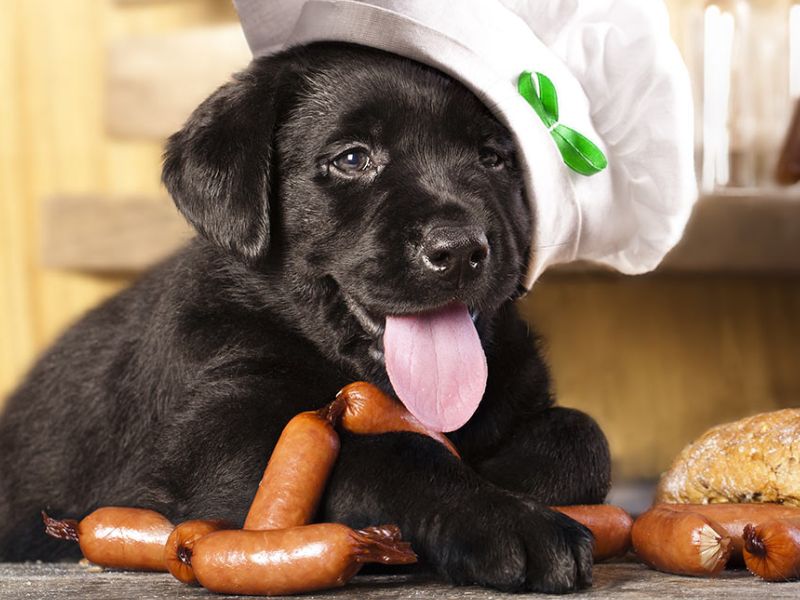
Dogs love bones, and it’s natural to want to give them a treat every once in a while. However, it’s essential to know which bones are safe for your furry friend and which ones to avoid. Pork bones, whether cooked or raw, are not recommended for dogs. They can easily splinter and cause choking, blockages, or even puncture the digestive system, leading to serious health problems.
Can Dogs Eat Pork Ribs
Pork ribs are a popular treat for humans, but can dogs eat pork ribs? The short answer is no. Pork ribs are not safe for dogs to eat, whether cooked or raw. They are small and can easily splinter, leading to choking or blockages in the digestive system. Additionally, pork ribs are high in fat, which can cause pancreatitis in dogs, a condition that can be life-threatening if left untreated.
Instead of giving your dog pork bones or ribs, there are many safer options available. You can try giving your dog rawhide chews, bully sticks, or specially made dog bones. These treats are designed to be safe for dogs to chew on and can help satisfy their natural urge to chew. It’s always best to consult with your veterinarian before introducing any new treats to your dog’s diet to ensure they are safe and appropriate.
In conclusion, it’s important to remember that not all bones are safe for dogs to eat. Pork bones and ribs, in particular, are not recommended due to the risk of splintering and causing serious health problems. Instead, opt for safer alternatives that are designed to be chewed on and are safe for your furry friend.
Can Dogs Eat Cooked Pork
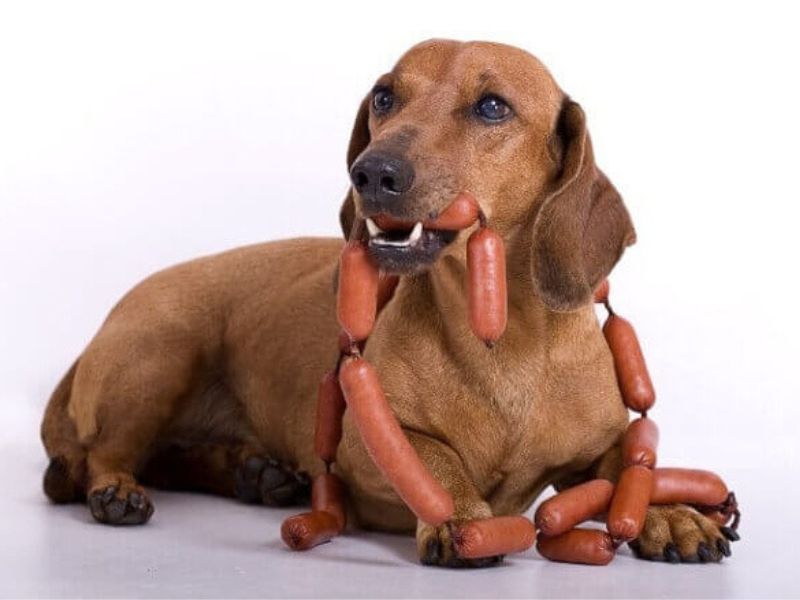
Pork is safe for dogs to consume, but some precautions must be taken to ensure their safety and well-being. Cooked, plain pork is safe for dogs to eat, as long as it is not seasoned with any harmful ingredients. Pork is a good source of protein and is often recommended by veterinarians as it is less likely to cause an allergic reaction in dogs compared to other protein sources.
Can Dogs Eat Pork Chops
Dogs can eat pork chops, but it is important to ensure that the meat is cooked thoroughly and there are no bones present. Bones can cause choking hazards, and cooked bones can splinter and cause internal injuries. Pork chops should be plain and not seasoned with any harmful ingredients such as garlic, onion powder, or nutmeg.
What About Pork Sausage
Pork sausage is not recommended for dogs as it often contains harmful ingredients such as garlic, onion powder, and other spices. These ingredients can cause digestive issues, anemia, and other health problems in dogs. If you want to feed your dog pork, stick to plain, cooked pork without any added seasonings or spices.
Can Dogs Eat Pork Rinds And Bacon
Pork rinds and bacon are high in fat and salt, which can cause digestive issues and other health problems in dogs. They should be avoided, or given in moderation as an occasional treat. Pork rinds and bacon should not be a regular part of a dog’s diet.
In conclusion, dogs can eat cooked pork, but it should be plain and cooked thoroughly. Pork chops can be given to dogs, but bones should be removed. Pork sausage, pork rinds, and bacon should be avoided or given in moderation as an occasional treat. It is always best to consult with a veterinarian before introducing new foods to a dog’s diet.


